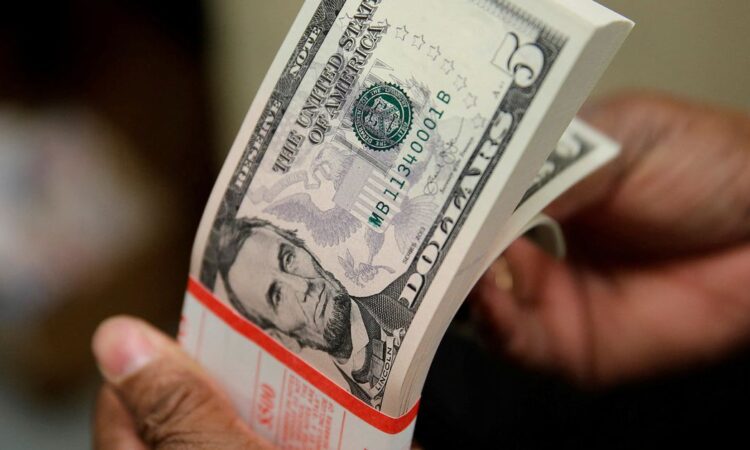
TOKYO, June 2 (Reuters) – The U.S. dollar wallowed near a one-week low versus major peers on Friday, on course for its worst week since mid-January, amid strengthening views that the Federal Reserve will forgo an interest rate hike this month.
The U.S. Senate’s passage of a bill to suspend the debt ceiling and avert a disastrous default also removed a pillar of support for the dollar, which had paradoxically been a key beneficiary because of its safe-haven status.
The Australian dollar surged after an increase in the minimum wage stoked bets for the central bank to raise rates again next week.
The U.S. dollar index , which measures the greenback against a basket of six rivals, weakened 0.06% to 103.48 in Asian trading, extending a 0.62% slide from Thursday, its worst day in almost a month.
For the week, the index is on course to lose 0.73%.
Philadelphia Fed President Patrick Harker said on Thursday that “it’s time to at least hit the stop button for one meeting and see how it goes,” referring to the June 13-14 meeting.
A day earlier, Fed Governor Philip Jefferson had said that “skipping a rate hike at a coming meeting would allow the committee to see more data before making decisions about the extent of additional policy firming.”
Some softness in U.S. manufacturing data overnight supported the case for a pause, although jobs figures continue to print hot, putting even more focus than usual on the monthly non-farm payrolls report later in the day.
“The key is non-farm payrolls tonight, which could determine if there’s going to be a hike in coming months, whether that’s in June or July,” said Shinichiro Kadota, senior currency strategist at Barclay in Tokyo.
“It’s really data-dependent at this point,” he added. “Maybe they hike in June, maybe in July, or maybe they don’t hike any more.”
Money markets currently see about 29% odds of a hike, down from near 70% earlier in the week.
The dollar ticked down 0.13% to 138.65 yen , after dropping to as low as 138.44 on Thursday for the first time since May 24.
The pair tends to track U.S. long-term Treasury yields , which were at 3.61% in Tokyo after dipping overnight to the lowest since Nov. 18 at 3.57%.
The euro was about flat at $1.0767, after reaching a one-week high of $1.07685 in the previous session, when European Central Bank President Christine Lagarde gave the shared currency a boost by saying further policy tightening was necessary.
Meanwhile, the Senate passed a bill to lift the government’s $31.4 trillion debt ceiling late on Thursday, getting it ready for President Joe Biden to sign well ahead of a Monday deadline.
“This clears the last residual bound to everything getting done and dusted by Monday’s X-date,” said Ray Attrill, head of foreign-exchange strategy at National Australia Bank.
“At the margin, it plays with the grain of the more risk positive view in the market, which is proving to be U.S. dollar negative.”
The Aussie rose as much as 0.61% to $0.6613, its strongest since May 24.
The primary driver was an announcement by Australia’s independent wage-setting body that it would raise the minimum wage by 5.75% from July 1.
Traders currently lay about one-third odds on a quarter-point rate hike on Tuesday. Even if a hike doesn’t happen next week, markets expect a hike by fall.
“This has seen market pricing for the RBA lift materially,” said NAB’s Attrill.
“That’s why Aussie is the outperformer today.”
Reporting by Kevin Buckland; Editing by Sam Holmes
Our Standards: The Thomson Reuters Trust Principles.




